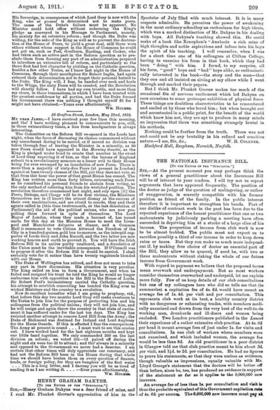10 Grafton Street, London, May 22nd, 1832. MY DEAR jicans,—I
have received your few lines this morning, and tho' I have nothing pleasant to communicate to you, still, in these extraordinary times, a line from headquarters is always interesting.
The Committee on the Reform Bill re-opened in the Lords last night, when the farce of discussing its clauses commenced without any amendment daring to be moved, or if moved no division was taken through fear of leaving the Ministry in a minority, as 50 new Peers would have appeared in the Morning Gazette, as the King is pledged under bond to create that number in the event of Lord Grey requiring it of him, so that the barons of England submit to a revolutionary measure as a lesser evil to their House being for ever swamped by an inundation of new Peers. There is more than a majority of sixty-five Peers (at present in London) against at least twenty clauses of the Bill, yet they dare not vote, so that from this hour the power of that great House has ceased. The King has written more than forty letters, entreating such Peers as he considered his personal friends to abstain from voting, as the only method of relieving him from his wretched position. The revolution therefore commenced last night, and rely upon [it] the Peers, Bishops, and Clergy will be its first victims, the Ministers themselves are in (I know) the utmost dismay at the success of their own machinations, and are afraid to recede, they and their agents called in (this time twelvemonth, at the last dissolution of Parliament) the aid of the political unions, who are now pro- pelling them forward in spite of themselves. The Lord Mayor of London, whom they made a baronet of, has issued cards for this day at the Mansion House to meet the Liver- pool and Manchester delegates at dinner, and a Common Rail is summoned to vote Citizen Attwood the Freedom of the City in a hundred-guinea gold box to-morrow, as the intrepid sup- porter of Lords Grey and John Russell, and the two latter are now working heaven and earth to prevent it. You will have the Irish Reform Bill in its native purity unaltered, and a dissolution of the Union must be the inevitable consequence. If O'Connell was to propose it after the Reform Bill it would be carried. I shall certainly vote for it rather than have twenty vagabonds blended with our House.
The Duke of Wellington has retired, and does not mean to take any part in their discussions. His situation is very peculiar. The King called on him to form a Government, and when he failed and resigned his trust he told the King he would no longer embarrass him with opposition to the Bill in the House of Lords. Sir Robert Peel's inconsistency carried the Catholic question, his attempt to establish consenting has handed the King over to wicked Ministers and the country to a revolution.
Now do recollect hereafter what I am going to prophesy, vid., that before this day two months Lord Grey will make overtures to the Tories to join him for the purpose of protecting him and his colleagues from the political unions; they will not join him, and he will resign and again throw the country in that state of excite- ment it has suffered under for the last ten days. The King has resisted another attempt to remove Lord Hill from the Army ; the Duke of Richmond was destined for Ireland and Lord Anglesey for the Horse Guards. If this is effected I fear the consequences. The Army at present is sound . . . I must wait to see this session out. I have worked hard for the last eighteen months and kept our little band together. We only commanded 260 on the last division on reform; we voted 241-13 paired off during the night and six were too ill to attend ; and tho' always in a minority and opposed to the Government we never had a deserter. I am certain that other times will duly appreciate our constancy, and had not the Reform Bill been in the House during that whole time we should have beaten them on every question of finance, trade, or foreign policy, for they are bunglers of the first water . . . This is a long letter, and I daresay you will be as tired of reading it as I am writing it. . . . —Ever yours affectionately, Wx. Houses.






































 Previous page
Previous page